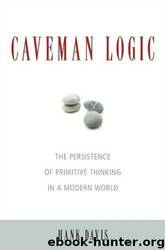Caveman Logic: The Persistence of Primitive Thinking in a Modern World by Hank Davis

Author:Hank Davis
Language: ru
Format: mobi, epub
Publisher: Prometheus Books
Published: 2010-08-24T05:00:00+00:00
SCIENCE’S GREATEST HITS
Just how much knowledge of science is out there? It’s not an easy thing to measure. In the last year or so, I’ve run an informal survey using what is often termed an “opportunistic” or “convenience sample.” In short, I’ve asked just about everyone with whom I came into contact. That might have been a disastrous approach if I were a more typical academic or shy about talking to strangers. Fortunately, I am neither. And so I asked this question of literally hundreds of people: “What do you think science is?” These six words usually produce a pause, which I immediately fill with the easier question, “What do you think of when you think of science?” That question intimidates fewer people since there is plainly no wrong answer. If someone says, “The Mona Lisa” or “Elvis Presley,” then so be it.
But nobody has. Their answers are all far more relevant, and surprisingly consistent. I’ve talked to undergraduate students; gas station attendants; baseball fans; grad students; colleagues; folk, jazz, and rock musicians; food and hardware store sales people; financial advisors; servers in restaurants and pubs; ex-girlfriends; and my housekeeper. The list is actually quite a bit longer and more varied, and many people in my sample are difficult to classify since they fit multiple categories. Their education ranges from some high school through PhD degrees.
With the exception of most of my colleagues and a few grad students, this informal census has yielded a surprisingly consistent pattern. Because what I report isn’t about being right or wrong, it doesn’t shed light on the issue of scientific literacy. But it does address the public perception of science. Most people think about the results of science, rather than its methods. More than 95 percent of the people I spoke with mentioned things like “space travel,” “medical cures,” and “wonder drugs.” Some people said “E=MC2” or mentioned Einstein. People talked about computers, and a few included plasma screen TVs and iPods. Cloning was a popular response and a few referred to stem cell research. And that was basically it. This is what most people I spoke with think about when they think of science.
As much as anything, this is essentially a “Science’s Greatest Hits” list, as reflected by media coverage. Conspicuous by its absence is any reference to the methods of science. The idea of gathering evidence, formulating or testing hypotheses, and building theories appeared in a very small percentage of responses, almost all of them coming from my colleagues or graduate students, all of whom are in the business of being scientists. This should surprise no one, but it is a sobering thought. For most people, the methods of science consist of hardware rather than logic. Perform your own survey and you will find that most people think that scientists go about their business using exotic instruments like particle accelerators or electron microscopes, and then they share their discoveries with the rest of us, who either accept them (if we can understand them) or stay clear of them.
Download
Caveman Logic: The Persistence of Primitive Thinking in a Modern World by Hank Davis.epub
This site does not store any files on its server. We only index and link to content provided by other sites. Please contact the content providers to delete copyright contents if any and email us, we'll remove relevant links or contents immediately.
| Administration & Medicine Economics | Allied Health Professions |
| Basic Sciences | Dentistry |
| History | Medical Informatics |
| Medicine | Nursing |
| Pharmacology | Psychology |
| Research | Veterinary Medicine |
The Art of Thinking Clearly by Rolf Dobelli(10446)
The 5 Love Languages: The Secret to Love That Lasts by Gary Chapman(9782)
Mindhunter: Inside the FBI's Elite Serial Crime Unit by John E. Douglas & Mark Olshaker(9315)
Becoming Supernatural by Dr. Joe Dispenza(8198)
Nudge - Improving Decisions about Health, Wealth, and Happiness by Thaler Sunstein(7689)
The Road Less Traveled by M. Scott Peck(7592)
Mastermind: How to Think Like Sherlock Holmes by Maria Konnikova(7316)
Enlightenment Now: The Case for Reason, Science, Humanism, and Progress by Steven Pinker(7305)
Win Bigly by Scott Adams(7183)
The Way of Zen by Alan W. Watts(6596)
Factfulness: Ten Reasons We're Wrong About the World – and Why Things Are Better Than You Think by Hans Rosling(4730)
The State of Affairs by Esther Perel(4710)
Gerald's Game by Stephen King(4640)
Man's Search for Meaning by Viktor Frankl(4575)
The Confidence Code by Katty Kay(4250)
Thinking in Bets by Annie Duke(4216)
The Healing Self by Deepak Chopra(3568)
Hidden Persuasion: 33 psychological influence techniques in advertising by Marc Andrews & Matthijs van Leeuwen & Rick van Baaren(3550)
The Worm at the Core by Sheldon Solomon(3483)
